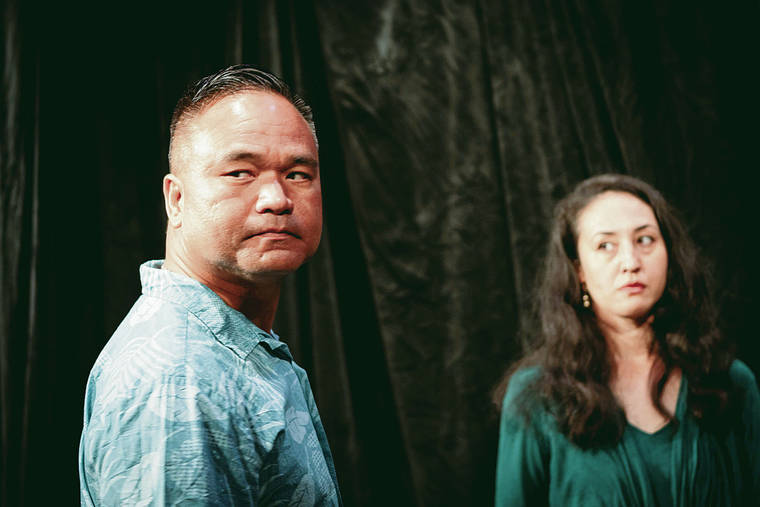Review: ‘Ua Pau’ a powerful conclusion to playwright’s milestone trilogy

COURTESY KUMU KAHUA
Charles Kupahu Timtim and Annie Lokomaika‘i Lipscomb star in Hawaiian playwright Alani Apio’s “Ua Pau (It Is Finished, Over, Destroyed).”
The story that Hawaiian playwright Alani Apio began in 1994 with “Kamau” and continued in 1997 with “Kamau A‘e” comes to a shocking and thought-provoking conclusion with “Ua Pau (It Is Finished, Over, Destroyed)” at Kumu Kahua. This is “must-see” local theater for adults and teens capable of handling the true-to-life sexual situations, realistically choreographed domestic violence and rapid-fire “adult” vocabulary.
A superbly talented cast brings Apio’s vividly drawn characters to life:
Maile Kapua‘ala stars as hapa haole millennial Stevie-Girl Kealoha, newly back in Hawaii after eight years attending college on the mainland. Her father, George Mahekona, a troubled young man overwhelmed by the prospect of supporting a family, committed suicide before she was born.
Charles Kupahu Timtim reprises his portrayal of tightly wound Alika Kealoha; Alika took responsibility for his dead cousin’s daughter, married her mother and from that time on did whatever it took to provide for them regardless of the personal cost to himself. Timtim originated the role of Alika in 1994 and developed it further in 1997. He brings it full circle here and caps an explosive, emotionally intense performance with a breathtaking moment in his final scene.
Wil Kahele contributes to the few and fleeting funny moments as Michael Mahekona. The oldest and most prone to violence of the three cousins, Michael did nine years in prison for assaulting a Hawaiian security guard he thought was a Caucasian. Michael is now 53 and seems to have made his peace with the hotel; he makes Hawaiian art to order for wealthy visitors.
Kirk A. Lapilio Jr. is a haunting presence as George Mahekona — a ghostly entity visible only to Stevie-Girl in the present, a timid and abused boy in the flashbacks.
Don't miss out on what's happening!
Stay in touch with breaking news, as it happens, conveniently in your email inbox. It's FREE!
Annie Lokomaika‘i Lipscomb brings other layers of fragility to the story as Lisa, a Caucasian of unspecified ethnicity, who feels increasingly isolated from her Hawaiian husband and hapa haole daughter.
Lelea‘e “Buffy” Kahalepuna- Wong doubles beautifully as Alika’s executive assistant in the present and his abused mother in flashbacks. Daryl Bonilla shows impressive range playing Alika’s genial and benevolent “boss” in the present and then morphing into the character of Dad, Alika’s brutal, alcoholic father.
An early flashback where Dad abuses all three boys, then hits his wife, foreshadows the boys’ experiences in “Kamau” and “Kamau A‘e.” A second flashback, where Dad encourages the boys to drink hard liquor, also foreshadows events to come.
As the story opens Stevie- Girl is returning home — traveling first class thanks to Alika’s connections. The corporation he works for — the corporation that built the hotel on the land Alika’s family tended for 14 generations — also paid for her college education, living expenses, car and credit card.
Nothing that comes after Stevie’s arrival is as she expected. However, the numerous surprises that follow feel authentic rather than contrived. Apio’s sure-handed use of flashbacks fills in the backstory for people who haven’t seen “Kamau” and “Kamau A‘e.”
In the previous plays Apio revealed the traditional relationship between Hawaiians and the aina without having a character give another character a lecture on the subject. He does something similar here in a scene where Stevie-Girl begins chanting. It isn’t necessary to understand Hawaiian to know what she’s saying or why she’s saying it.
—
‘Ua Pau (It is Finished, Over, Destroyed)’
>> Where: Kumu Kahua Theatre, 46 Merchant St.
>> When: 8 p.m. Thursday-Saturday through Sept. 21; also at 2 p.m. Sunday, through Sept. 22
>> Cost: $25 (discounts available)
>> Info: kumukahua.org Opens in a new tab or 536-4441




